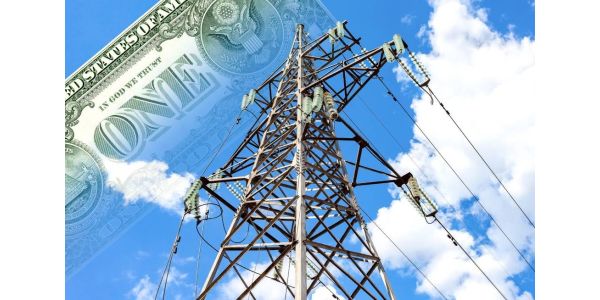EnergyPricing.com / Electricity Rates
What to Know about Utility Prices by Zip Code
- Energy deregulation in certain states allows you to choose your own provider and save money.
- Use online comparison tools like EnergyPricing.com to assist you in your search for a new electricity plan.
- The average utility cost by zip code fluctuates due to various economic factors. Learn more about the average electric bill by zip code on individual state pages.
Current Electricity Rates
Current and future electricity rates are affected by a number of factors. These include:
- Weather conditions
- Government regulations
- Energy demand on the power grid
- Competition among energy providers
Below is a chart detailing the average electricity prices across all the deregulated states in the United States. As you can see, prices have been volatile in every market. This volatility continued throughout 2024, and industry experts forecast similar activity going into 2025. This enforces the importance of securing a favorable electricity plan.
Energy Deregulation
If you live in the United States, there’s a chance that your state participates in energy deregulation. In fact, today there are over twenty U.S. states with deregulated electricity. We are licensed to do business and offer electricity rates in all fourteen states that are fully deregulated.
Click on your state below for state-specific information and view available electricity costs by zip code.
How You Can Compare Electricity Company Prices
Shopping for a new energy plan has never been easier, thanks to EnergyPricing.com. Just follow these simple steps:
-
Click the Get Started Button
This will direct you to all our available electricity providers in your area. -
Compare Rates and Providers
Our easy-to-use interface allows you to compare all the providers and plans effortlessly. -
Enroll Online
Once you find the perfect plan, you can enroll online in less than 2 minutes.
Here's what our customers have to say
Would you like to see how it works in real-time?
Watch the video below to learn how to shop online with EnergyPricing.com.


Factors to Consider When Choosing an Electricity Plan
When shopping for a new electricity plan, these are the most important factors for you to consider:
- Price: Be sure to compare different rates and plans from each provider to find the best options for your needs and budget.
- Read Customer Reviews: Many customers will post reviews of their experience with each provider. This can be a great way to get an idea of the customer service and reliability of each company.
- Company Size: Consider the number of customers a company has. It can indicate their size and stability. A larger customer base means more resources to meet customer demands.
- Company History: Researching a company's history can help you gauge its reliability. A company with a long history of reliable service is a positive sign of its longevity.
- Read the Contract: Read the entire agreement carefully before committing yourself to any provider. Look for hidden fees or penalties, cancellation clauses, and contract length.
- Contract Length: Most electric providers offer plans from one month to three years. You may be able to save money with a longer-term plan. However, make sure you understand the cancellation fees before committing yourself to any provider. Also, pay attention to auto-renewal terms.
Types of Electricity Plans
There are a variety of electricity plans for you to choose from. Here are the most commonly available types and their advantages:
Fixed-Rates Plans
With a fixed-rate energy plan, your electricity rate is locked in for the duration of your contract. This means you'll pay the same rate for every kilowatt-hour (kWh) of electricity you use. That’s true regardless of market fluctuations. This is the most common type you will find on our website.
Variable-Rate Plans
Unlike fixed-rate plans, variable-rate plans (Indexed Plans) fluctuate with the energy market. Your bill may vary based on market conditions.
100% Green Energy Plans
A 100% Green Energy Plan is a great choice for sustainability-minded consumers. However, it's important to note that the electricity flowing through your power lines may not be 100% Green Energy. Instead, most electric providers offset your energy usage by purchasing Renewable Energy Credits (RECs). RECs are generated from solar or wind energy.
Promotional Energy Plans
Promotional energy plans offer savings through lower rates or unique billing structures. Popular options include free weekend plans and monthly usage bill credit plans. However, customers should carefully review the Supplier's Electricity Facts Label (EFL) to understand pricing and potential additional costs.
Business electricity plans can often be more complex. Make sure to speak to one of our energy experts to assist you. Our team will help you find the best commercial electricity rates.
Top Energy Companies in the U.S.
Determining the top energy company at any specific time is a challenge. However, we can rely on the report from the U.S. Energy Information Administration, which ranks electricity providers based on their customer base. According to this reliable source, the top 10 energy companies are:
- TXU Energy Retail Co, LLC - 1,742,792 customers
- Constellation NewEnergy, Inc - 1,709,901 customers
- Reliant Energy Retail Services - 1,676,373 customers
- Direct Energy Services - 945,223 customers
- Energy Harbor Corp. - 929,013 customers
- Ambit Energy Holdings, LLC - 629,935 customers
- Dynegy Energy Services, LLC - 621,095
- AEP Energy - 492,834 customers
- Green Mountain Energy Company - 487,495 customers
- Reliant Energy Northeast LLC - 453,850 customers
It is important to note that the energy companies mentioned above are not the only available options for residents and small business owners. As an educated shopper, you should also consider new, emerging energy companies as well. They often offer the cheapest rates on the market in order to undercut the major companies.
At EnergyPricing.com, we make sure to partner with reputable companies of any size, giving you access to all of the best offers in the marketplace. To compare electricity rates by zip code, click the Get Started button.
Business Electricity Rates
Business owners know the importance of having a favorable business electricity plan for their accounts. Even the smallest difference in commercial electricity rates can have a significant impact on monthly bills. A great business electricity plan also helps with budget planning.
EnergyPricing.com is a revolutionary platform that simplifies the process of receiving quotes from multiple electric companies. Use our technology to get instant quotes from your computer or smartphone effortlessly. Join us today and enjoy the benefits of EnergyPricing.com!
- Direct Access to Commercial Electricity Providers. Our interface lets you submit commercial electricity accounts directly to our network of business energy providers. Just sit back and watch the bids come in!
- Expert Advice. Unsure which plan or business energy provider to use? No need to worry. You will have access to an industry expert who can help you.
Whether you’re searching for small business electricity rates or plans for large buildings, we will be able to assist. EnergyPricing.com serves customers of all sizes.
Tips to Save Money on Your Electricity Bill
To lower your monthly electricity bill, try shopping for better rates, investing in energy-efficient equipment, and be mindful of your energy usage habits.
- Shop for Better Rates - To lower your monthly electricity bill, consider shopping around for better rates. EnergyPricing.com is the go-to source for this, as we pre-screen all our suppliers and energy plans to bring you the best options.
- Energy Efficiency Measures - Invest in LED light bulbs, Energy Star-certified refrigerators, washing machines, dishwashers, and programmable thermostats. These choices will reduce your energy costs and contribute to a greener and more sustainable future.
- Smart Usage Habits - Embracing smart energy usage habits can significantly contribute to saving on your electricity bills. You can actively reduce your energy consumption and enjoy lower monthly bills by turning off lights and electronics when not in use, sealing air leaks in your home, and opting for fans instead of air conditioning.
Ready to Start Pricing? Save Today!
Ready to begin your search? Just click the Get Started Button below to begin comparing rates
Electricity Rates Blogs: News, Trends, and Updates
Frequently Asked Questions
What is EnergyPricing.com?
EnergyPricing.com is an online marketplace that connects residential and commercial customers in deregulated electricity and natural gas states with energy suppliers.
How does EnergyPricing.com make money?
We’re a registered electricity and natural gas broker with the PUC in each state where we operate. Thus, energy suppliers pay us a small referral fee for connecting customers like you with them.
What is energy deregulation, and how does it affect me?
Energy deregulation gives you the power to select your own energy supplier. You’re able to take advantage of the energy market and control your energy expenses.
Does my bill still come from the utility company?
There are two types of billing options when it comes to your energy agreements.
The first is consolidated, which means one bill from the utility company.
The second is dual billing. Dual billing means one bill from the supplier for the supply costs and one bill from the utility for distribution costs. Most standard agreements will be consolidated billing.
What should I look for in an energy plan?
The cheapest rate is not always going to be the best option for you. There are a variety of factors that need to be weighed before you make a decision.
Some of those include the components that make up the cost, cancellation terms, and also your individual business factors. For example, how long will you be at your current location? Will your consumption stay constant or go up and down?
Luckily, we are well-versed in the procurement industry and have years of experience to help guide you through this process.










